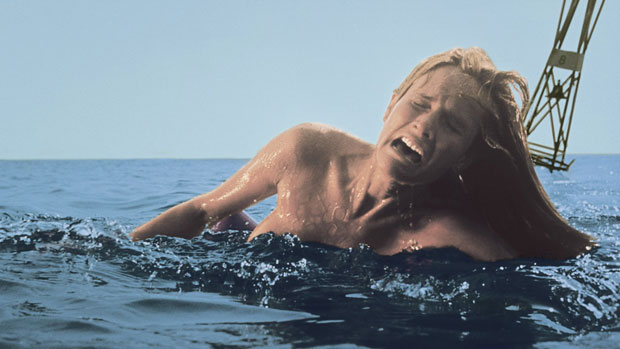Jaws turns 40: dissecting the legacy of the shark megahit
Decades after its 1975 release, Jaws remains a global phenomenon

A free daily email with the biggest news stories of the day – and the best features from TheWeek.com
You are now subscribed
Your newsletter sign-up was successful
Forty years after it opened on 20 June 1975 in an unusually wide release across North America, Jaws' impact on the film industry – as well as our attitudes towards sharks – can still be seen.
Based on the novel 'Jaws', written by Peter Benchley in 1974, the movie rights to the story were sold for $150,000 to film producers Richard Zanuck and David Brown. The aquatic thriller went on to become a smash hit and has, when adjusted for inflation, taken $2bn worldwide since it first came out, making it the second most successful franchise film after Star Wars.
In 2001 the film was selected for preservation by the Library of Congress due to it being "culturally, historically, or aesthetically significant".
The Week
Escape your echo chamber. Get the facts behind the news, plus analysis from multiple perspectives.

Sign up for The Week's Free Newsletters
From our morning news briefing to a weekly Good News Newsletter, get the best of The Week delivered directly to your inbox.
From our morning news briefing to a weekly Good News Newsletter, get the best of The Week delivered directly to your inbox.
The story of a great white shark terrorising a small eastern seaboard beach resort has been examined from all angles by critics and academics since its release. To celebrate its 40th anniversary, De Montfort University in Leicester is to hold a One Day Symposium where academics will speak on a range of topics from 'Masculinity and Crisis in Jaws' to 'Jaws: The Case of the Archetypal American Villain as Queer Dissident Attacking the Heteronormative'.Here are just a few examples of the film's impact:
Shark attacks
The film's tagline "Don't go in the water", alongside the chilling John Williams soundtrack, and the iconic opening sequence appear to have put many viewers off ocean swimming altogether. The summer of 1975 saw a sharp decline in the number of beachgoers in the US and, according to shark biologist George Burgess, there was a "precipitous decline in US shark populations, as thousands of fishers set out to catch trophy sharks after seeing Jaws". Though the chance of dying from a shark attack is just one in 3,748,067, the film still plays a role in some people's fear of the water today. In 2013 a professor at the University of Wisconsin-Madison conducted a study which showed 43 per cent of students who had seen the film had "enduring problems" with swimming.
Birth of the summer blockbuster
A free daily email with the biggest news stories of the day – and the best features from TheWeek.com
The release of Jaws is widely regarded as the birth of the summer blockbuster; however its June release date was something of a surprise at the time. Previous big-budget Hollywood films had almost exclusively been released in the winter months, usually around Christmas. The decision to release Jaws during summer was due in part to the film's content. According to Mark Kermode in The Guardian, producer Brown deliberately delayed the film until people were "in the water off the summer beach resorts".
Kermode says Jaws also capitalised on the rise of air-conditioned multiplexes in suburban America which offered people the chance to avoid the sweltering heat outside by watching a movie. The legacy of Jaws has been such that in the years that followed its 1975 release, many other box office hits, including the Star Wars trilogy, were released during the summer months.
Spielberg's success
Jaws was originally going to be directed by another American filmmaker, Dick Richards. However, the film's producers were unimpressed after Richards referred to the shark as a 'whale' in a series of meetings and instead offered the film to Spielberg. Spielberg was a relative unknown at the time having only directed one full-length feature and the production of Jaws was said to be a testing experience for the young director. "I thought my career as filmmaker was over," Spielberg later told a newspaper, as the production became known as "Flaws" due to the film going $5m over budget and falling 104 days behind in its shooting schedule.
However, once released, the success of Jaws earned Spielberg his first Academy Award nominations, including for Best Picture, and made him one of America's youngest multi-millionaires. Jaws gave the director a springboard from which he went on to become one of the most well-known filmmakers of his generation. Following Jaws, he directed ET, Indiana Jones and Jurassic Park among others, winning three Academy Awards in the process.
-
 Political cartoons for February 18
Political cartoons for February 18Cartoons Wednesday’s political cartoons include the DOW, human replacement, and more
-
 The best music tours to book in 2026
The best music tours to book in 2026The Week Recommends Must-see live shows to catch this year from Lily Allen to Florence + The Machine
-
 Gisèle Pelicot’s ‘extraordinarily courageous’ memoir is a ‘compelling’ read
Gisèle Pelicot’s ‘extraordinarily courageous’ memoir is a ‘compelling’ readIn the Spotlight A Hymn to Life is a ‘riveting’ account of Pelicot’s ordeal and a ‘rousing feminist manifesto’
-
 The 8 best biopic movies of the 21st century (so far)
The 8 best biopic movies of the 21st century (so far)the week recommends Not all true stories are feel good tales, but the best biopics offer insight into broader social and political trends
-
 Was Masters of the Air worth the wait?
Was Masters of the Air worth the wait?The Week Recommends Following 2001's hit war drama Band of Brothers and The Pacific in 2010, the story shifts from land and water to sky
-
 40 years of 'The Color Purple' backlash
40 years of 'The Color Purple' backlashUnder the Radar Beloved and decried, the novel and films have always struck a nerve
-
 Oscars 2023 predictions: who will win the top awards?
Oscars 2023 predictions: who will win the top awards?feature ‘Everything Everywhere All At Once’ swept this year’s shortlists
-
 Film review: West Side Story
Film review: West Side StoryThe Week Recommends Steven Spielberg’s ravishing remake of the classic 1961 musical
-
 Spielberg WWI movie hit by Stonehenge row
Spielberg WWI movie hit by Stonehenge rowSpeed Read Conservationists say filming upcoming war drama 1917 nearby could harm archaeological features
-
 Oscar predictions 2022: who will win the top awards?
Oscar predictions 2022: who will win the top awards?In Depth There are ten nominees for Best Picture this year in the hopes of broadening the Oscar talent pool
-
 The ten best historical movies
The ten best historical moviesIn Depth From Battleship Potemkin to Lawrence of Arabia, The Week takes a look at some of the highlights of historical cinema